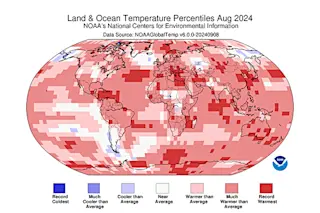Our planet still can't seem to beat the heat.
Last month was the warmest August on record. "Sweltering" was the word used by the normally staid National Oceanic and Atmospheric Administration to sum up the findings of its regular monthly analysis.
And August wasn't just a one-off. By NASA's independent calculation, last month caps the hottest summer in the Northern Hemisphere since global record-keeping began in the 1800s. It also extends our planet's heat streak to 15 straight months of record setting global temperatures.
This bar graph shows how summer global temperatures in 2023 (in yellow) and 2024 (in red) varied from the long-term average. (The white lines indicate the range of estimated temperatures.) These warmer-than-usual summers continue a long-term trend of warming, driven primarily by human-caused greenhouse gas emissions. (Credit: NASA/Peter Jacobs)
NASA/Peter Jacobs
June, July and August of 2024 — meteorological summer in the Northern Hemisphere — together ...














